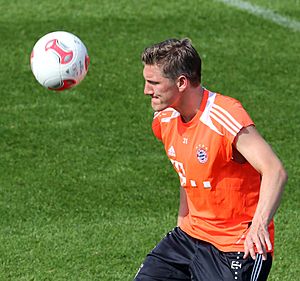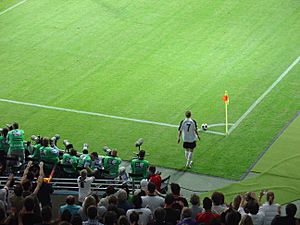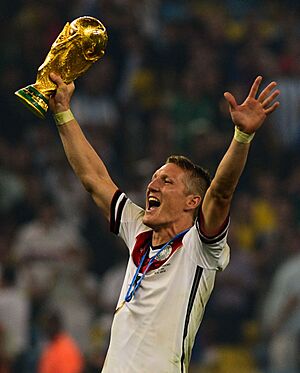Bastian Schweinsteiger facts for kids
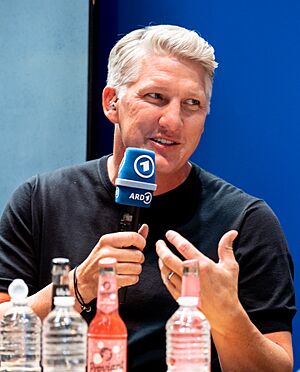
Schweinsteiger in 2023
|
|||||||||||||||||||||||||||||||||||||
| Personal information | |||||||||||||||||||||||||||||||||||||
|---|---|---|---|---|---|---|---|---|---|---|---|---|---|---|---|---|---|---|---|---|---|---|---|---|---|---|---|---|---|---|---|---|---|---|---|---|---|
| Full name | Bastian Schweinsteiger | ||||||||||||||||||||||||||||||||||||
| Date of birth | 1 August 1984 | ||||||||||||||||||||||||||||||||||||
| Place of birth | Kolbermoor, West Germany | ||||||||||||||||||||||||||||||||||||
| Height | 1.83 m (6 ft 0 in) | ||||||||||||||||||||||||||||||||||||
| Position(s) | Midfielder | ||||||||||||||||||||||||||||||||||||
| Youth career | |||||||||||||||||||||||||||||||||||||
| 1990–1992 | FV Oberaudorf | ||||||||||||||||||||||||||||||||||||
| 1992–1998 | TSV 1860 Rosenheim | ||||||||||||||||||||||||||||||||||||
| 1998–2002 | Bayern Munich | ||||||||||||||||||||||||||||||||||||
| Senior career* | |||||||||||||||||||||||||||||||||||||
| Years | Team | Apps | (Gls) | ||||||||||||||||||||||||||||||||||
| 2001–2005 | Bayern Munich II | 34 | (2) | ||||||||||||||||||||||||||||||||||
| 2002–2015 | Bayern Munich | 342 | (45) | ||||||||||||||||||||||||||||||||||
| 2015–2017 | Manchester United | 18 | (1) | ||||||||||||||||||||||||||||||||||
| 2017–2019 | Chicago Fire | 85 | (8) | ||||||||||||||||||||||||||||||||||
| Total | 479 | (56) | |||||||||||||||||||||||||||||||||||
| International career | |||||||||||||||||||||||||||||||||||||
| 2000 | Germany U16 | 1 | (0) | ||||||||||||||||||||||||||||||||||
| 2001–2002 | Germany U18 | 11 | (2) | ||||||||||||||||||||||||||||||||||
| 2002–2003 | Germany U19 | 7 | (2) | ||||||||||||||||||||||||||||||||||
| 2004 | Germany U21 | 7 | (2) | ||||||||||||||||||||||||||||||||||
| 2004–2016 | Germany | 121 | (24) | ||||||||||||||||||||||||||||||||||
|
Medal record
|
|||||||||||||||||||||||||||||||||||||
| *Club domestic league appearances and goals | |||||||||||||||||||||||||||||||||||||
Bastian Schweinsteiger (born 1 August 1984) is a German former professional footballer. He played as a midfielder, which means he helped both attack and defense in the middle of the field. At first, he played more on the sides of the field, but later he moved to a central role. Many people, including former German national team coach Joachim Löw, think he is one of Germany's best players ever.
Schweinsteiger played for Bayern Munich for 17 seasons. He played 500 games and scored 68 goals for them. With Bayern, he won many titles, including eight Bundesliga titles (Germany's top league), seven German Cup titles (DFB-Pokal), and a UEFA Champions League title. He also won the FIFA Club World Cup and the UEFA Super Cup. In 2015, he moved to Manchester United in England. After playing there for about 18 months, he joined Chicago Fire in the United States. He stopped playing professional football in October 2019.
Schweinsteiger also played for the German national team from 2004 to 2016. He is one of Germany's most capped players, meaning he played in many international games (121 times), scoring 24 goals. He played in four European Championships and three World Cups. He was a key player when Germany won the 2014 FIFA World Cup. In that final, he played a very important role in stopping Lionel Messi. After Philipp Lahm retired from international football in 2014, Schweinsteiger became the captain of the national team. He played his last game for Germany in August 2016.
Since retiring as a player in 2019, Schweinsteiger has worked as a football expert for German TV. He appears on the channel ARD and its show Sportschau.
Contents
Club Career Highlights
Playing for Bayern Munich
Bastian Schweinsteiger joined FC Bayern Munich as a young player on 1 July 1998. He moved up through the club's youth teams. When he was younger, he was also a very good ski racer and had to choose between skiing and football. After winning the German youth championship in July 2002, he quickly joined the reserve team. He played well in the third division.
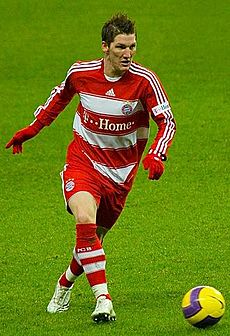
At first, when he played for the main team, he was a left-back (a defensive player on the side). After only two training sessions with the first team, coach Ottmar Hitzfeld gave Schweinsteiger his first game. He was 18 years old and came on as a substitute in a UEFA Champions League game in November 2002. He made an immediate impact, helping to create a goal within minutes. He signed a professional contract the next month. In his first season (2002–03), he played in 14 league games and helped Bayern win both the league and the cup. The next season, he played 26 league games. He scored his first goal for Bayern in September 2003.
At the start of the 2004–05 season, the new coach Felix Magath sent him back to the reserve team for a short time. But Schweinsteiger quickly returned to the main team and helped them win the league and cup again. He scored his first Champions League goal in a quarter-final game against Chelsea. Over the next three seasons, until 2008, Schweinsteiger played 135 games for Bayern Munich in all competitions, scoring 10 goals.
On 15 August 2008, Schweinsteiger scored the first goal of the 2008–09 season. In December of that year, he signed a new contract to stay with Bayern until 2012. Two years later, in December 2010, he extended his contract again until 2016. This was announced at the Allianz Arena after a 3–0 win.
On 25 April 2012, Schweinsteiger scored the winning penalty kick against Real Madrid. This sent Bayern to the 2012 UEFA Champions League Final, where they played Chelsea. The final ended 1–1 and went to a penalty shootout. Chelsea won the shootout, and Schweinsteiger's shot was saved.
In the 2012–13 season, Schweinsteiger played very well as a central midfielder with Javi Martínez. On 6 April 2013, Schweinsteiger scored a special backheel goal against Eintracht Frankfurt. This goal helped Bayern win the Bundesliga title. The season was amazing for Schweinsteiger and Bayern, as they won a "treble." This means they won three major trophies: the Bundesliga, the DFB-Pokal (German Cup), and the Champions League.
Because of his great performance, Schweinsteiger was named the 2013 German Player of the Year. His coach, Jupp Heynckes, even called him the best midfielder in the world.
He scored a goal against Manchester United in the first game of their 2013–14 UEFA Champions League quarter-final. However, he later received a red card in that match.
He played his first game of the 2014–15 season in a 4–0 win. On 16 May 2015, he scored the first goal in a game against SC Freiburg. On 23 May 2015, Schweinsteiger played his 500th game for Bayern. This was his last match with the club. He moved to Manchester United on 13 July 2015, after being at Bayern for 17 years.
Schweinsteiger was very popular with Bayern fans. They often called him Fußballgott, which means "football god."
Time at Manchester United
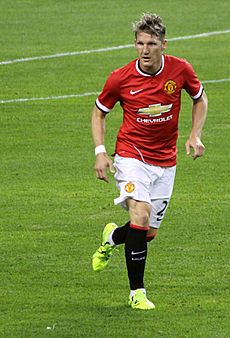
On 13 July 2015, Manchester United signed Schweinsteiger on a three-year contract. They paid about €9 million for him. He was the first German player to play for Manchester United's main team. He wore shirt number 31, which was the same number he wore at Bayern.
Schweinsteiger played his first game for Manchester United in a friendly match on 17 July 2015. His first Premier League game was on 8 August. He came on as a substitute and helped his team win 1–0. On 28 November, he scored his first goal for the club with a header in a 1–1 draw.
In January 2016, he got a knee injury that kept him out for two months. Then, in March, he had another knee injury that ended his season.
After a new manager, José Mourinho, arrived, Schweinsteiger did not play as much. He returned to training with the main team at the end of 2016. He played his first game since March in November 2016. He made his first start in over a year in January 2017. In that game, he scored his first goal at Old Trafford (Manchester United's stadium) with a special overhead kick. Fans voted him "Man of the Match" for his goal and an assist.
Playing for Chicago Fire
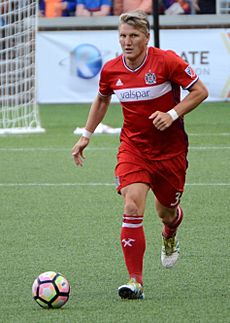
On 21 March 2017, Manchester United allowed Schweinsteiger to join Major League Soccer team Chicago Fire in the United States. The move was completed on 29 March. A few days later, his former manager, Mourinho, said he "regretted" how he had treated Schweinsteiger. On 1 April, Schweinsteiger played his first game for Chicago Fire and scored a goal in a 2–2 draw.
By the middle of the season, he helped Chicago reach the top of the MLS standings. He was chosen for the "MLS All-Star Fan XI" team to play against Real Madrid. After helping the Fire reach the playoffs, Schweinsteiger signed for another year in 2018. He scored a goal and provided an assist in a 2–2 draw in April 2018. In August, he scored a long-range goal after coming on as a substitute. In July, Schweinsteiger scored a goal and assisted another in a 4–3 home game.
Retirement from Football
On 8 October 2019, Bastian Schweinsteiger announced that he was retiring from professional football. A few days later, the German TV channel ARD announced that Schweinsteiger would work as a football expert for their live broadcasts.
International Career for Germany
On 6 June 2004, Schweinsteiger played his first game for the German senior squad in a friendly match. He was part of the German team for every major tournament from Euro 2004 until Euro 2016.
Early Tournaments (2004-2006)
After playing in the under-21 European Championships in 2004, he was called up for Euro 2004. He helped set up a goal in Germany's 2–1 loss.
He scored his first two international goals in June 2005 against Russia. He scored his first goal in a competitive match against Tunisia at the Confederations Cup in Germany. He was chosen for the 2006 FIFA World Cup which was held in Germany. He became very well known at this tournament. He scored two amazing long-range goals in the third-place match against Portugal. He was named "Man of the Match" for this game, which Germany won 3–1.
Euro 2008 and 2010 World Cup
During the Euro 2008 qualifiers, Schweinsteiger scored two goals in a record 13–0 win against San Marino. He also scored in Germany's 4–1 win against Slovakia.
In the UEFA Euro 2008 tournament, he was sent off in a game against Croatia. After missing one game, he returned to the team in the quarter-final against Portugal. He was very important in Germany's 3–2 win, scoring one goal and helping with two others. He also scored Germany's first goal in the 3–2 semi-final win against Turkey. He was captain of the team for the first time in a friendly game.
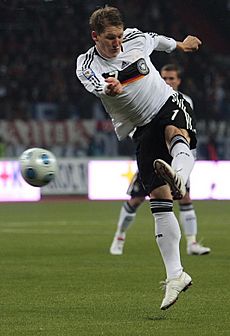
Schweinsteiger played often in the 2010 World Cup qualifying games, scoring three goals. Before the World Cup, he scored two penalty kicks in a 3–1 win.
During the 2010 FIFA World Cup, Schweinsteiger took on a big role in the middle of the field. He was important for both Germany's attack and defense. He was named "Man of the Match" after the quarter-final game against Argentina, where he helped with two goals and also managed to control Lionel Messi. Germany lost to Spain in the semi-finals. Germany then won 3–2 against Uruguay in the third-place match. Schweinsteiger was the captain for this game.
Overall, Schweinsteiger had three assists in seven matches in South Africa. He was one of the top assist providers in the tournament. Because of his excellent play, he was chosen as one of 10 finalists for the Golden Ball, which is given to the best player of the tournament.
Euro 2012 and 2014 World Cup Victory
Schweinsteiger became the main defensive midfielder in Germany's qualifying group for Euro 2012. He played five matches and helped Germany win all 10 of their qualifying games.
Schweinsteiger started all five of Germany's matches at the UEFA Euro 2012 finals. He helped with both of Mario Gómez's goals in a 2–1 win against the Netherlands.
Schweinsteiger played five games as Germany qualified for the 2014 FIFA World Cup. On 15 October 2013, he played his 100th game for the national team in a 5–3 win.
He started in the third group game against the United States. He kept his place in the team for Germany's round of 16 match, a 2–1 win. He was very important in the World Cup final against Argentina. He controlled the midfield with his passes, helping Germany's attack. Germany won the World Cup final 1–0 with a goal in extra time.
Euro 2016 and International Retirement
Before the Euro 2016 qualifiers began, Schweinsteiger was named the new captain for Germany after Philipp Lahm retired. In March 2016, he injured his knee during national team training. He recovered in time to be chosen for Germany's squad for UEFA Euro 2016. In May, Schweinsteiger was selected for Germany's final 23-man squad. Around this time, he was also featured as a minifigure in a special Lego collection about the German football team.
On 12 June 2016, Schweinsteiger scored a goal in extra time in a 2–0 win against Ukraine. Nine days later, Schweinsteiger set a new record for the German player with the most appearances in a European Championship match. After the tournament, Schweinsteiger announced he was retiring from international football. He had played 120 games and scored 24 goals for Germany. One month later, he played his very last international game for Germany against Finland. Manuel Neuer became the new captain after him.
How Bastian Schweinsteiger Played
Schweinsteiger mostly played in the middle of the field. But he was very flexible and could also play on the sides, either left or right. During his years with Bayern, he was seen as one of the best midfielders in the world. Schweinsteiger had a powerful shot from far away. He was also great at crossing the ball and taking set-pieces (like free kicks). He had lots of energy too.
He was called a "two-way player" because he was good at both attacking and defending. He could also play in many other roles, such as a holding midfielder (who protects the defense), an attacking midfielder (who helps score goals), a box-to-box player (who runs all over the field), a playmaker (who creates chances), and a deep-lying midfield player (who starts attacks from deep). Schweinsteiger was strong, graceful, and had great technique. He was known for his good passing, vision (seeing the whole field), and creativity. He could control the game in midfield and create chances for his teammates. People called him the "Midfield Motor" because of his energy. He was also very good at reading the game and scoring goals because he was always in the right place. Coach Joachim Löw called him "the brain" of the German national team.
Besides his attacking and creative skills, he was also known for his strong defense, hard work, and good tackling. Because of his great performances, he was voted the best German player of the year in 2013. When he played for Chicago, Schweinsteiger sometimes even played as a central defender or sweeper (a player who sweeps up loose balls behind the defense). He could do this because of his good vision and defensive skills. In these deeper roles, he not only defended but also helped start attacks from the back. His former Chicago Fire manager, Veljko Paunović, said Schweinsteiger was "unique and special" when he retired. He called him a "complete player" and mentioned that in Germany, they called him a 'Fussballgott' (a "football god") because he represented everything good about the sport.
Personal Life
Bastian Schweinsteiger is a Roman Catholic. Fans often call him "Schweini" or "Basti." "Basti" helps tell him apart from his older brother, Tobias Schweinsteiger, who was also a professional footballer. Bastian was in a relationship with model Sarah Brandner from 2007 to 2014.
In September 2014, he started a relationship with Serbian tennis player Ana Ivanovic. They got married on 12 July 2016 in Venice, Italy. They have two sons, born in 2018 and 2019. In February 2023, they announced they were expecting their third child.
Schweinsteiger was a talented ski racer when he was young. He is childhood friends with the famous skier Felix Neureuther.
Career Statistics
Club
| Club | Season | League | National cup | League cup | Continental | Other | Total | |||||||
|---|---|---|---|---|---|---|---|---|---|---|---|---|---|---|
| Division | Apps | Goals | Apps | Goals | Apps | Goals | Apps | Goals | Apps | Goals | Apps | Goals | ||
| Bayern Munich II | 2001–02 | Regionalliga Süd | 4 | 0 | — | — | — | — | 4 | 0 | ||||
| 2002–03 | Regionalliga Süd | 23 | 2 | 1 | 0 | — | — | — | 24 | 2 | ||||
| 2003–04 | Regionalliga Süd | 4 | 0 | — | — | — | — | 4 | 0 | |||||
| 2004–05 | Regionalliga Süd | 3 | 0 | 1 | 0 | — | — | — | 4 | 0 | ||||
| Total | 34 | 2 | 2 | 0 | — | — | — | 36 | 2 | |||||
| Bayern Munich | 2002–03 | Bundesliga | 14 | 0 | 1 | 2 | 0 | 0 | 1 | 0 | — | 16 | 2 | |
| 2003–04 | Bundesliga | 26 | 4 | 3 | 0 | 1 | 0 | 3 | 0 | — | 33 | 4 | ||
| 2004–05 | Bundesliga | 26 | 3 | 5 | 0 | 0 | 0 | 7 | 1 | — | 38 | 4 | ||
| 2005–06 | Bundesliga | 30 | 3 | 4 | 0 | 1 | 0 | 7 | 0 | — | 42 | 3 | ||
| 2006–07 | Bundesliga | 27 | 4 | 3 | 0 | 2 | 0 | 8 | 2 | — | 40 | 6 | ||
| 2007–08 | Bundesliga | 30 | 1 | 4 | 0 | 2 | 1 | 12 | 0 | — | 48 | 2 | ||
| 2008–09 | Bundesliga | 31 | 5 | 4 | 2 | — | 9 | 2 | — | 44 | 9 | |||
| 2009–10 | Bundesliga | 33 | 2 | 4 | 1 | — | 12 | 0 | — | 49 | 3 | |||
| 2010–11 | Bundesliga | 32 | 4 | 5 | 2 | — | 7 | 2 | 1 | 0 | 45 | 8 | ||
| 2011–12 | Bundesliga | 22 | 3 | 3 | 1 | — | 11 | 1 | — | 36 | 5 | |||
| 2012–13 | Bundesliga | 28 | 7 | 5 | 0 | — | 12 | 2 | — | 45 | 9 | |||
| 2013–14 | Bundesliga | 23 | 4 | 4 | 1 | — | 8 | 3 | 1 | 0 | 36 | 8 | ||
| 2014–15 | Bundesliga | 20 | 5 | 2 | 0 | — | 6 | 0 | 0 | 0 | 28 | 5 | ||
| Total | 342 | 45 | 47 | 9 | 6 | 1 | 103 | 13 | 2 | 0 | 500 | 68 | ||
| Manchester United | 2015–16 | Premier League | 18 | 1 | 2 | 0 | 1 | 0 | 10 | 0 | — | 31 | 1 | |
| 2016–17 | Premier League | 0 | 0 | 2 | 1 | 1 | 0 | 1 | 0 | 0 | 0 | 4 | 1 | |
| Total | 18 | 1 | 4 | 1 | 2 | 0 | 11 | 0 | — | 35 | 2 | |||
| Chicago Fire | 2017 | MLS | 24 | 3 | 1 | 0 | — | — | 1 | 0 | 26 | 3 | ||
| 2018 | MLS | 31 | 4 | 4 | 0 | — | — | — | 35 | 4 | ||||
| 2019 | MLS | 30 | 1 | 0 | 0 | — | — | 1 | 0 | 31 | 1 | |||
| Total | 85 | 8 | 5 | 0 | — | — | 2 | 0 | 92 | 8 | ||||
| Career total | 479 | 56 | 58 | 10 | 8 | 1 | 114 | 13 | 4 | 0 | 663 | 80 | ||
International
| National team | Year | Apps | Goals |
|---|---|---|---|
| Germany | 2004 | 10 | 0 |
| 2005 | 13 | 4 | |
| 2006 | 18 | 9 | |
| 2007 | 6 | 0 | |
| 2008 | 15 | 4 | |
| 2009 | 10 | 2 | |
| 2010 | 12 | 2 | |
| 2011 | 6 | 2 | |
| 2012 | 7 | 0 | |
| 2013 | 3 | 0 | |
| 2014 | 8 | 0 | |
| 2015 | 6 | 0 | |
| 2016 | 7 | 1 | |
| Total | 121 | 24 | |
- Scores and results list Germany's goal tally first, score column indicates score after each Schweinsteiger goal.
| No. | Date | Venue | Cap | Opponent | Score | Result | Competition |
|---|---|---|---|---|---|---|---|
| 1 | 8 June 2005 | Borussia-Park, Mönchengladbach, Germany | 14 | 1–1 | 2–2 | Friendly | |
| 2 | 2–1 | ||||||
| 3 | 18 June 2005 | Rhein-Energie Stadion, Cologne, Germany | 16 | 2–0 | 3–0 | 2005 FIFA Confederations Cup | |
| 4 | 29 June 2005 | Zentralstadion, Leipzig, Germany | 18 | 2–1 | 4–3 | 2005 FIFA Confederations Cup | |
| 5 | 22 March 2006 | Westfalenstadion, Dortmund, Germany | 25 | 1–0 | 4–1 | Friendly | |
| 6 | 30 May 2006 | BayArena, Leverkusen, Germany | 27 | 2–2 | 2–2 | Friendly | |
| 7 | 2 June 2006 | Borussia-Park, Mönchengladbach, Germany | 28 | 2–0 | 3–0 | Friendly | |
| 8 | 8 July 2006 | Gottlieb-Daimler-Stadion, Stuttgart, Germany | 35 | 1–0 | 3–1 | 2006 FIFA World Cup | |
| 9 | 3–0 | ||||||
| 10 | 6 September 2006 | Stadio Olimpico, Serravalle, San Marino | 38 | 2–0 | 13–0 | UEFA Euro 2008 qualifying | |
| 11 | 7–0 | ||||||
| 12 | 7 October 2006 | Ostseestadion, Rostock, Germany | 39 | 1–0 | 2–0 | Friendly | |
| 13 | 11 October 2006 | Tehelné pole, Bratislava, Slovakia | 40 | 3–0 | 4–1 | UEFA Euro 2008 qualifying | |
| 14 | 19 June 2008 | St. Jakob-Park, Basel, Switzerland | 54 | 1–0 | 3–2 | UEFA Euro 2008 | |
| 15 | 25 June 2008 | St. Jakob-Park, Basel, Switzerland | 55 | 1–1 | 3–2 | UEFA Euro 2008 | |
| 16 | 20 August 2008 | Frankenstadion, Nuremberg, Germany | 57 | 1–0 | 2–0 | Friendly | |
| 17 | 6 September 2008 | Rheinpark Stadion, Vaduz, Liechtenstein | 58 | 4–0 | 6–0 | 2010 FIFA World Cup qualification | |
| 18 | 28 March 2009 | Zentralstadion, Leipzig, Germany | 64 | 3–0 | 4–0 | 2010 FIFA World Cup qualification | |
| 19 | 12 August 2009 | Tofik Bakhramov Stadium, Baku, Azerbaijan | 68 | 1–0 | 2–0 | 2010 FIFA World Cup qualification | |
| 20 | 3 June 2010 | Commerzbank-Arena, Frankfurt, Germany | 74 | 2–1 | 3–1 | Friendly | |
| 21 | 3–1 | ||||||
| 22 | 10 August 2011 | Mercedes-Benz Arena, Stuttgart, Germany | 88 | 1–0 | 3–2 | Friendly | |
| 23 | 7 October 2011 | Türk Telekom Arena, Istanbul, Turkey | 90 | 3–1 | 3–1 | UEFA Euro 2012 qualifying | |
| 24 | 12 June 2016 | Stade Pierre-Mauroy, Villeneuve-d'Ascq, France | 116 | 2–0 | 2–0 | UEFA Euro 2016 |
Honours and Awards
Bayern Munich Juniors
- Under 17 Bundesliga: 2001
- Under 19 Bundesliga: 2002
Bayern Munich II
- Regionalliga Süd: 2003–04
Bayern Munich
- Bundesliga: 2002–03, 2004–05, 2005–06, 2007–08, 2009–10, 2012–13, 2013–14, 2014–15
- DFB-Pokal: 2002–03, 2004–05, 2005–06, 2007–08, 2009–10, 2012–13, 2013–14
- DFL-Ligapokal: 2007
- DFL-Supercup: 2010
- UEFA Champions League: 2012–13; runner-up: 2009–10, 2011–12
Manchester United
- FA Cup: 2015–16
Germany National Team
- FIFA World Cup: 2014 (Winner); third place: 2006, 2010
- UEFA European Championship: runner-up: 2008; third place: 2012
- FIFA Confederations Cup third place: 2005
Individual Awards
- Silbernes Lorbeerblatt: 2006, 2010, 2014 (This is Germany's highest sports award)
- FIFA World Cup Dream Team: 2010
- FIFA World Cup top assist provider: 2010 (3, shared with others)
- Germany national team Player of the Year: 2010
- ESM Team of the Year: 2012–13
- Footballer of the Year in Germany: 2013
- UEFA Best Player in Europe Award: 2013 (7th place)
- FIFA FIFPro World XI 3rd team: 2013
- FIFA FIFPro World XI 4th team: 2014
- Bambi Award: 2016
- MLS All-Star: 2017, 2019
- Bayern Munich Hall of Fame: 2018
Orders
See also
 In Spanish: Bastian Schweinsteiger para niños
In Spanish: Bastian Schweinsteiger para niños
 | Calvin Brent |
 | Walter T. Bailey |
 | Martha Cassell Thompson |
 | Alberta Jeannette Cassell |


